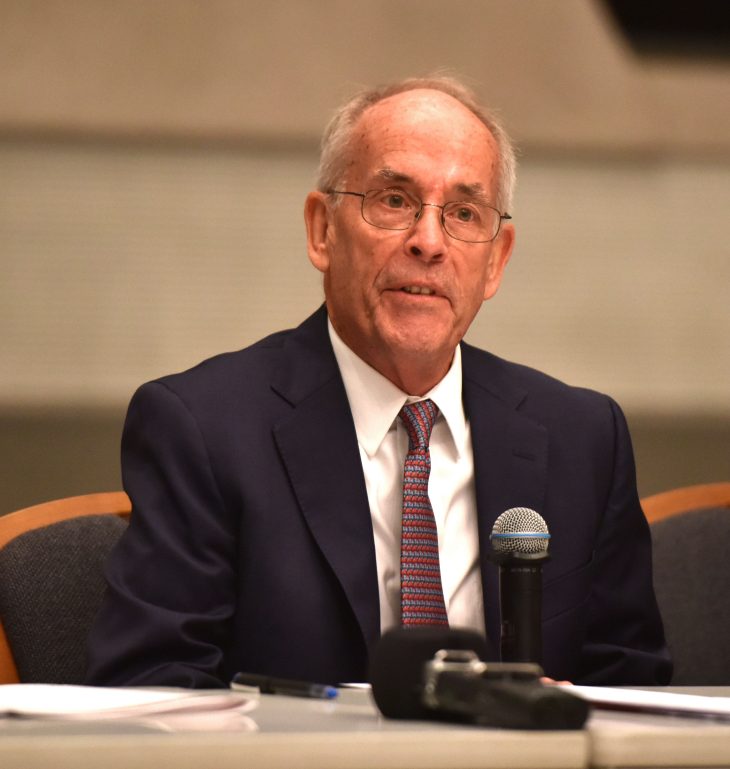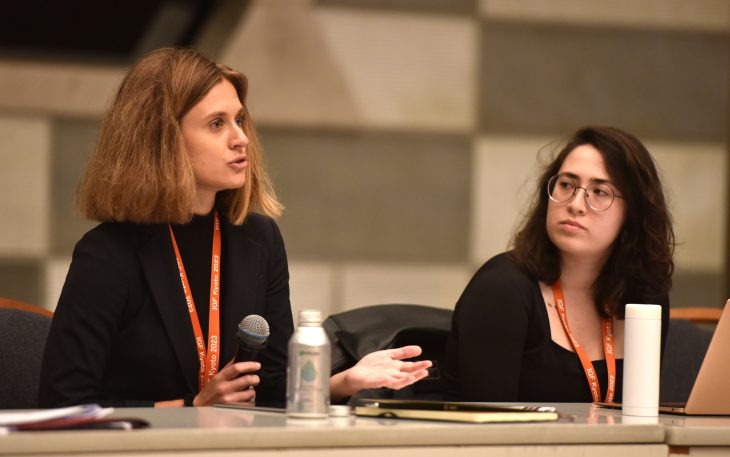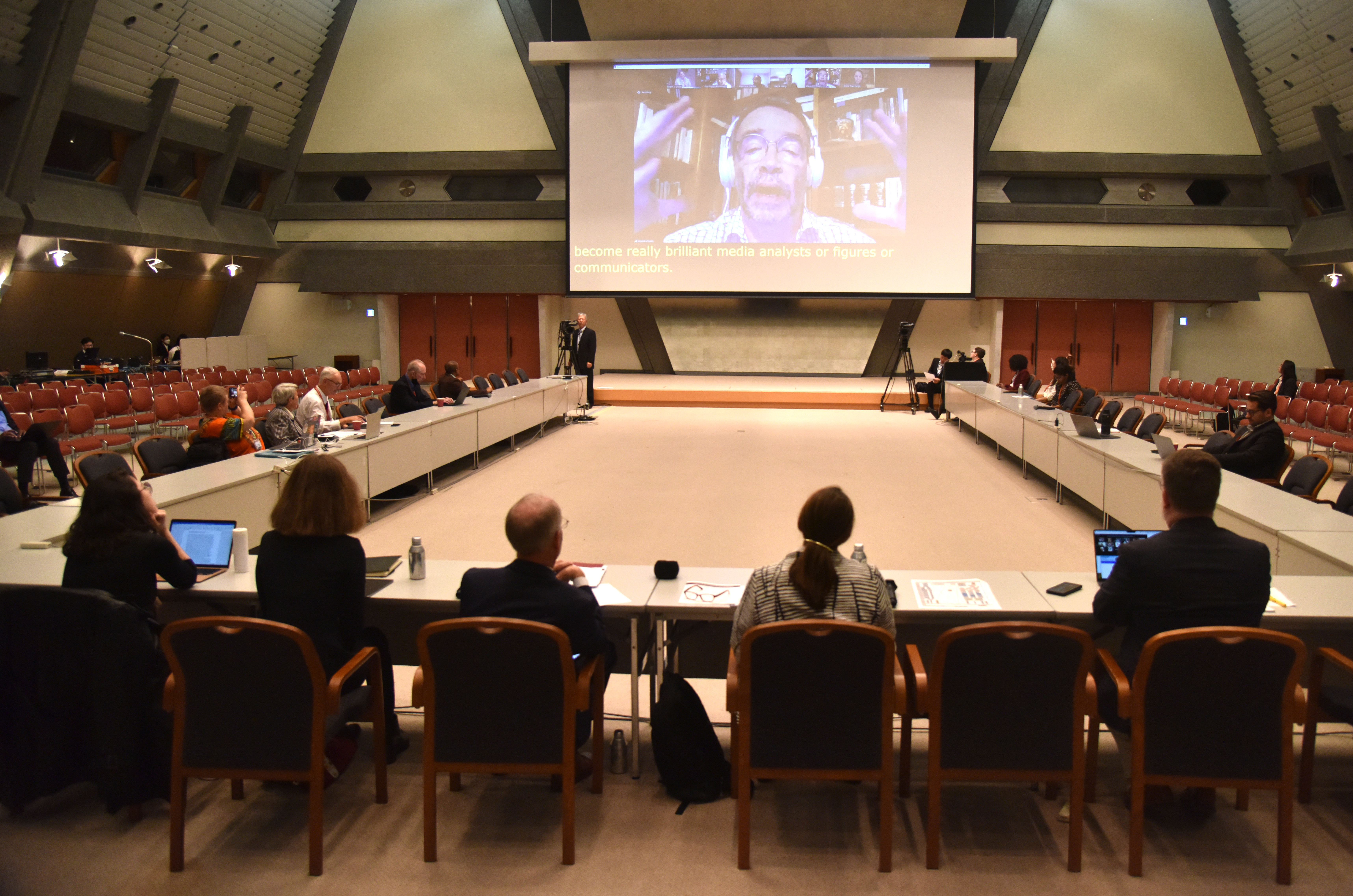President Connie Ledoux Book was joined by scholar-in-residence Lee Rainie, formerly of the Pew Research Centers, in presenting the statement at the United Nations Internet Governance Forum in Kyoto, Japan, on Oct. 9
With artificial intelligence broadening its impact on all aspects of life, Elon University leaders have coordinated development of a statement of principles to guide higher education institutions as they prepare humanity for the revolution brought about by this rapidly evolving and groundbreaking technology.

The statement was co-authored by President Connie Ledoux Book, Elon scholar-in-residence Lee Rainie and Professor Divina Frau-Meigs of Sorbonne Nouvelle University in Paris and has generated support from more than 140 higher education leaders and scholars from more than 40 countries. The authors were joined by fellow scholars on Monday, Oct. 9, in Kyoto, Japan, at the United Nations 18th annual Internet Governance Forum. They led a discussion about the multitude of ways higher education institutions can develop artificial intelligence literacy and commit to serving society’s best interests as these technologies continue to expand.
Book explained that the six principles offered in the statement embody a call for the higher education community to be an integral partner in development and governance of AI.
“The statement provides a framework for leaders at colleges and universities around the world as they develop strategies to meet the challenges of today and tomorrow,” Book said during the session, which generated in-person and online attendees from around the globe. “At Elon University, faculty are adapting the statement as they create policies on AI and design new approaches to teaching and learning.”
The six holistic principles that are outlined in the statement are:
-
People, not technology, must be at the center of our work
-
We should promote digital inclusion within and beyond our institutions
-
Digital and information literacy is an essential part of a core education
-
AI tools should enhance teaching and learning
-
Learning about technologies is an experiential, lifelong process
-
AI research and development must be done responsibly
The statement issues a call for the higher education community, and not just those within traditional technology fields, to be deeply involved in the development of governance mechanisms for AI, mechanisms that should crafted by multiple stakeholders.
“Educators in all fields are well suited to provide intellectual and ethical guidance, conduct much-needed research, serve as trustworthy watchdogs and be advocates for learners, teachers and society,” the statement reads.
Rainie joined Elon this year as scholar-in-residence after two decades of working as a partner to Elon’s Imagining the Internet Center as director of internet and technology research for the Pew Research Center. At the session in the Kyoto International Convention Center, he explained that the six principles bring time-tested truths to artificial intelligence and are essential for maintaining human rights, human autonomy and human dignity.
“Clearly, we are at a singular moment now as AI spreads through our lives,” Rainie said. “In the past, tools and machines were created to enhance or surpass the physical capacities of humans. The advent of AI brings technologies that enhance or surpass our cognitive capacities.”

As he joins Elon, Rainie begins a research effort to gather data in a survey of global experts and a survey of the general public in the United States to explore the views of both groups about how the benefits and harms of AI may unfold in the years to come. That work, which will be released in early 2024, builds upon the decades of work of the Imagining the Internet Center to catalogue the insights of hundreds of experts about how the digital revolution impacts humanity.
Rainie noted that past surveys have generated a wide range of answers to questions about the digital revolution, but there is a universal purpose that can be seen driving those answers. “They want us to think together to devise solutions that yield the greatest possible achievements with the least possible pain,” Rainie said.
With the introduction of new generative AI tools such as ChatGPT in late 2022 and the increasing integration of AI technologies into a broader range of platforms, discussion around its long-term impact has exploded. Given the increasing complexity of AI systems and the newness of the technology, those discussions have often foster panic upon many in the population.
“As researchers, we have to resist the panic, the current panic about AI systems and the fact they might produce superintelligence that is more intelligent than us,” said Frau-Meigs, who serves as the UNESCO chair for Savoir-Devenir in sustainable digital development. “We need to lift fear and anxiety. … we as universities have to come up with solutions for learners worldwide.”
Frau-Meigs said it is important to promote media and information literacy first to create a familiarity with concepts and issues that allows larger segments of the public to move on to AI literacy. “We want to leave a space for understanding and for adoption,” she said.

Joining the statement authors for Monday’s session were other scholars from a range of disciplines who examined how higher education can proactively engage in AI governance and development.
Alejandro Pisanty, a professor of internet governance and the information society at the National Autonomous University of Mexico, said the ongoing development of AI is having an impact on higher education by drawing talent away from university research centers. “First-world countries are seeing what we have suffered from in developing countries for decades, which is brain drain,” said Pisanty, a member of the Internet Hall of Fame.
That makes it important for higher education to take a proactive role in the development and governance of AI in the years ahead. “The highest cost we would incur is the cost of doing nothing,” he said.
Francisca Oladipo, vice chancellor and professor of computer science at Thomas Adewumi University in Nigeria similarly warned against inaction and the temptation to think that the issues surrounding AI are only related to this in fields related to technology and computer science.
“In Nigeria, we have viewed AI as something for computer people, but that’s no longer the case,” Oladipo said. “We need to be more inclusive to embrace everyone because the application of AI is across every field.”
Also participating in Monday’s session at the Internet Governance Forum:
- Siva Prasad Rambhatla
Retired professor and leader of the Centre for Digital Learning, Training and Resources, University of Hyderabad, India
- Wei Wang
Member of the IGF Dynamic Coalition on Data and Artificial Intelligence Governance; teaching fellow, Fundação Getulio Vargas (FGV) think tank in Brazil; University of Hong Kong School of Law doctoral student
- Eve Gaumond
Law researcher at the University of Montreal Public Law Research Center focused on artificial intelligence in higher education, freedom of expression in a digital context and access to justice
- Renata de Oliveira Miranda Gomes
IGF 2023 Youth delegate representing Brazil; recently earned a master’s degree in communication at the University of Brasilia



